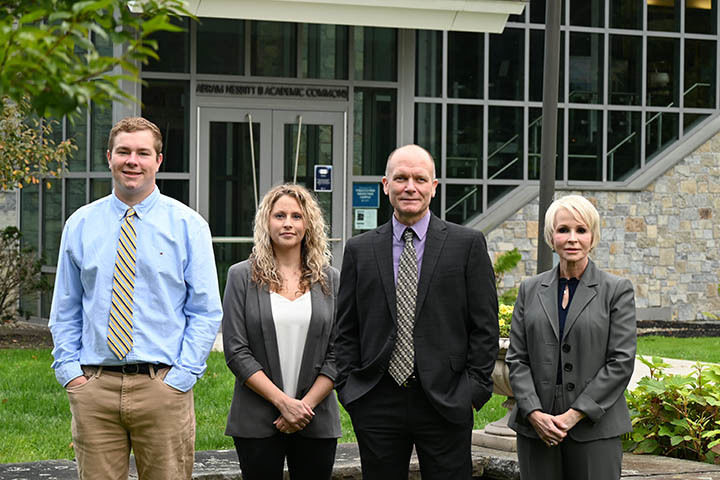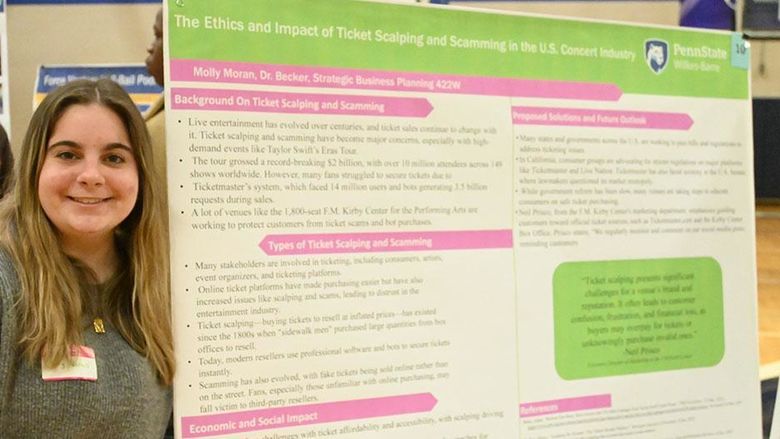
From left: Brad Killian, Melisa Littleton, Jeremy Olson and Rebecca Sarver will discuss “Happiness and Crime: Four Findings from a National Study” on Friday, Feb. 25.
LEHMAN, Pa. — Researchers from Penn State Wilkes-Barre will present their findings from a national study examining the link between happiness and crime, on Friday, Feb. 25, at 12:15 p.m. The Research Showcase Series event will be held in the Tech Center 101 Auditorium and is open to the campus community and the public.
Jeremy Olson, assistant professor of criminal justice; Rebecca Sarver, assistant teaching professor of criminal justice; Melisa Littleton, assistant teaching professor of rehabilitation and human services; and Brad Killian and Steven Qarmout, students and research assistants, will discuss “Happiness and Crime: Four Findings from a National Study.”
“The study investigated how happiness, or what we call satisfaction with life, impacts engagement in crime and deviance. Satisfaction with life is a cognitive perception about how well people think they are doing in life,” Olson said.
During the presentation, he will give an overview of the research questions, hypotheses, methods and results from the study. Olson devotes about half of his academic research to ideas regarding happiness and crime.
“All of the research I’ve come across to date, including my own, lacks in some component of measuring happiness or crime, leaving us somewhat uncertain on how the two are connected. The funding and support that Penn State Wilkes-Barre gave me on this project has allowed us to answer some of the important remaining questions about happiness and crime,” Olson said. “I think the results of this research offer some of the strongest theoretical support to the idea that increasing happiness can impact crime. We are also able to offer a valid way to measure happiness attained in specific domains for a happiness model used with offenders. The measure should help researchers and practitioners better understand how happiness can impact crime and then amplify existing — or build new — programs to effectively change offending behaviors.”
Olson said the happiness and crime study is important to criminal justice and other social services.
“So much of what we do is designed to change or influence how people feel about their pains and to reduce the distresses in their lives, without really focusing on increasing the satisfaction in their lives," he said. "But criminal justice and social service systems often work under philosophies that include an idea of increasing happiness. This study helps confirm that we might be able to reduce deviance by working directly to increase happiness."
Sarver added, “This study will also help us confirm whether the language of happiness is universal among people. If that is the case, criminal justice and social service agencies can begin to use that universal language to improve client engagement with services and to meet more of their goals. The language could also allow agencies to collaborate among each other in ways that can benefit both the agencies and their clients.”
The study participants reflect the demographics of the American adult population in terms of age, sex/gender, race/ethnicity, education and income.
“We believe it is among the most complete, if not the most complete, happiness-crime studies to have been completed to date,” Olson said.
“Prior to our creating and validating this instrument, researchers and practitioners were limited in assessing the success of efforts to increase happiness under this model, and to know whether any increased happiness could be associated with reduced crime,” he said. “We believe the availability of this new instrument will help move both the model of happiness and the field itself forward.”
Killian and Qarmout are both research assistants in the criminal justice program at Penn State Wilkes-Barre. Killian, a fourth-year student majoring in administration of justice, is in his third year as a research assistant. Qarmout is a first-year student at Penn State Wilkes-Barre who hopes to major in forensic science. The student researchers were required to complete the University’s Institutional Review Board training for protecting human research subjects and to adhere to research protocols.




